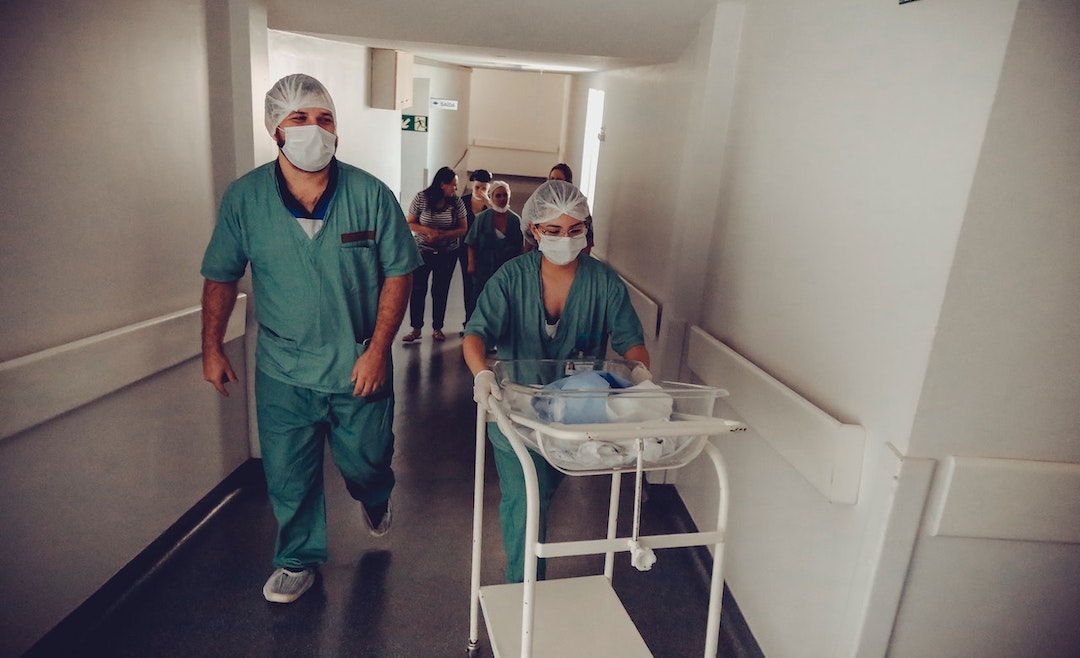Medical assistants are entry-level healthcare workers that support other staff by performing a wide variety of clinical and administrative tasks. They are an essential part of the healthcare system.
Medical assistants can choose to focus on one type of task. Those who specialize in patient-focused tasks are called clinical medical assistants.
Clinical medical assistants can also become certified through organizations like the National Healthcareer Association, which offers the Certified Clinical Medical Assistant (CCMA) certification.
This guide will go over everything you need to know about clinical medical assistants including their responsibilities, median salary, how to become one, and more.
Clinical Medical Assistant Job Description & Duties
The main duties of clinical medical assistants involve basic aspects of patient care. Some typical job duties are:
- Taking vitals. This includes taking various measurements such as blood pressure, pulse, weight, and blood oxygen levels. These are usually taken before the physician comes in to see the patient.
- Collecting laboratory specimens. These specimens include urine, stool, and blood. After collection, they are sent to the laboratory for analysis.
- Giving injections. In some states, medical assistants can give injections such as vaccinations, provided that they have the necessary training to do so.
- Taking patient histories. Patient history is an important part of healthcare. Medical assistants can help determine the patient’s chief complaint or their main reason for their office visit. This also involves asking patients about past health problems, medications, social habits, and whether they have a family history of certain conditions.
- Maintaining patient records. Accurate and up-to-date patient records are also key to providing quality healthcare. Medical assistants must follow all policies and laws created to protect patient health information.
- Drawing blood. In some states, medical assistants can draw blood if they have the appropriate training to do so.
- Removing sutures, bandages from wounds. Medical assistants can help with the post-surgical and post-injury healing process by carefully removing sutures and bandages from patients’ wounds.
- Maintaining exam rooms. Medical assistants also help keep the exam room neat, well-stocked, and ready for patient care.
Where Clinical Medical Assistants Work
Clinical medical assistants enjoy a great degree of flexibility in choosing where they work. As a result, they can be found in a variety of healthcare facilities. Some of the most common workplace settings include:
- Hospitals Large healthcare settings, such as hospitals, offer chances for medical assistants to work in specialties, such as pediatrics, gastroenterology,, cardiology, and emergency departments. Medical assistant work in hospitals tends to be faster paced, as there is usually a larger volume of patients compared to other settings.
- Outpatient clinics These clinics provide care for patients who do not need to stay overnight. Depending on the size of the clinic, the work pace can be similar to what you would experience working in a hospital.
- Private practices These are typically smaller, independent healthcare facilities with fewer employees. They are often offices of physicians. Clinical medical assistants may find themselves also taking on other roles, such as answering phone calls or scheduling appointments.
Skills Required to Be a Clinical Medical Assistant
Great clinical medical assistants possess a variety of soft and hard skills that allow them to do their job effectively. Some skills required to be a clinical medical assistant include:
- Basic clinical skills. For example, clinical medical assistants should know how to take blood pressure, case histories, and measure blood oxygen levels.
- Understanding medical terminology. In order to work effectively in a healthcare setting, medical assistants must understand medical terminology. This is especially important when communicating with other staff, such as physicians, nurses, and physician assistants.
- Knowledge of the electronic health record. Essentially all healthcare settings use some form of electronic health record software. This software is used for many important functions, such as patient health history, scheduling, and billing.
- Organized. A typical workday in the clinic can be hectic, with many things going on at the same time. As a result, it is essential for clinical medical assistants to stay organized and focused so they can perform their duties effectively.
- Great customer service. At its core, working with patients is customer service. It is important to be empathetic, patient, and caring when addressing any concerns they may have.
- Attention to detail. Accurately charting patient information requires good listening skills and a fine eye for detail. Otherwise, errors can occur, which will end up creating more work for other employees.
- Ability to learn quickly. Because clinical medical assistants perform a wide variety of tasks, they may encounter things they are unfamiliar with. For example, they may need to learn how to operate instruments, use software, or comply with new workplace policies.
- Stress management. Working as a clinical medical assistant can be stressful. They may have to deal with dissatisfied patients, challenging coworkers, and/or busy schedules. It is important to be able to keep their cool when facing these challenges.
>> Read More: Clinical Medical Assistants vs. Medical Assistants
Clinical Medical Assistant Certification Options
Washington is the only state that requires a certification to work as a medical assistant. Thus, in the majority of states, a certification is not necessary. However, some employers prefer to hire certified applicants.
There are several certification options available for medical assistants. The most relevant one for clinical medical assistants is the CCMA certification, which is offered through the NHA. The NHA is an organization that helps advance healthcare careers by providing certification and other resources.
To take the CCMA exam, you first need to meet eligibility requirements. The typical requirement is successfully completing an approved medical assistant training program within the last 5 years. An alternative eligibility requirement can be satisfied by completing 1 year of supervised work as a medical assistant.
The 3-hour long exam covers a broad range of topics such as clinical patient care, communication, and basic science. Once you pass the exam, you receive your CCMA certification.
Other certification exams test similar material to the CCMA exam. However, the exact format and topic distribution will vary. Other certifications for medical assistants are:
- CMA. This certification is offered by the American Association of Medical Assistants. In order to become eligible to take their exam, you will need to complete an approved medical assistant training program that includes a practicum.
- RMA. This certification is offered by the American Medical Technologists, They provide several routes for becoming eligible for their exam, including through an approved training program, work experience, or military medical experience.
- NCMA. This certification is offered by the National Center for Competency Testing. Like with the RMA certification, they also provide several routes for becoming eligible to take their exam.
How to Become a Clinical Medical Assistant
As mentioned above, a CCMA certification is not usually needed to work. However, it is generally viewed as the most relevant certification for clinical medical assistants. Here are the general steps to becoming a clinical medical assistant:
1) Earn your high school diploma or GED. This is the minimum requirement needed in order to work as a clinical medical assistant.
2A) Complete a medical assistant training program. These programs are offered through community colleges, trade schools, and online. For example, Stepful’s online medical assistant training program is designed to help you pass the NHA CCMA exam.
2B) Complete 1 year of supervised work in the MA field. An alternative way to become eligible to take the CCMA exam without going through a training program is to work for at least 1 year as a medical assistant in a supervised setting. You need to have done this within the past 3 years in order for it to count.
3) Apply for the CCMA exam or another certification. Once you have met the eligibility criteria for the exam, it is time to apply to take it. The application can be found on each organization’s respective website. You can check your eligibility for the NHA CCMA exam here.
4) Schedule your exam. Applicants typically schedule their exam a few months away, so that they have enough time to prepare and study.
5) Study up! Now that your exam is scheduled, all that is left to do is prepare so that you can do your very best. There are many free and paid resources available on the NHA website to aid you in your preparation, such as content outlines and practice tests.
6) Take your exam. The CCMA exam is 3-hours long, multiple-choice, and consists of 30 pretest questions and 150 scored questions. It can be taken either in-person or online. In-person exams are administered either at your school or in an approved testing center.
7) Wait for your results. If your NHA CCMA exam was offered through an online format, your scores will be posted within 2 days. If you do not pass your exam, you are allowed two more attempts, spaced 30 days apart. If you still do not pass, you must then wait 1 year before each subsequent attempt. Keep in mind that each time you take the exam, you must pay the exam fee of $160.
8) Apply for jobs. Once you have your certification, you can confidently apply for jobs knowing that you have boosted your qualifications!
Certified Clinical Medical Assistant Salaries & Job Outlook
The median annual salary for medical assistants in 2023 was $42,000. Overall, medical assistants earned median annual salaries that ranged from $29,070 to $48,170.
Although the BLS does not break down salaries by certification, you can expect CCMA salaries to fall within a similar range. CCMAs may potentially earn higher salaries due to their increased qualifications and potential for landing better paying positions.
The job outlook for medical assistants is positive with the BLS forecasting a 14% increase in jobs by 2032. This faster than average job growth means that there should be plenty of open medical assistant positions in the next decade.
Clinical Medical Assistant FAQs
What is a clinical medical assistant?
A clinical medical assistant is a healthcare worker that assists other hospital staff in providing patient care.
What do clinical medical assistants do?
Some responsibilities of clinical medical assistants include recording patient information in the electronic health record, taking vitals, and relaying instructions to patients.
How much do clinical medical assistants make?
The national median salary for medical assistants in 2023 was $42,000 which comes out to $20.19 per hour.
How long does it take to become a clinical medical assistant?
The amount of time will vary depending on the type of program you choose. On the shorter side are online programs (like ours here at Stepful) which takes 4 months to complete. On the longer side are associate degree programs offered through community colleges, which can take anywhere from 9 months to 2 years to finish.
What certification do clinical medical assistants need?
In the majority of states, clinical medical assistants do not need a certification in order to work. However, having any one of the recognized certifications can greatly boost your resume. Some of the most popular certifications are CCMA, CMA, RMA, and NCMA.
How much do clinical medical assistant training programs cost?
Costs will vary depending on the program you choose. For example, Stepful’s Online Clinical Medical Assistant Training Program costs only $1,799 to $2,399, depending which scholarship you qualify for. Associate degree programs vary widely in cost. They can be anywhere from $1,500 to $10,000 or more.
Is a clinical medical assistant or medical administrative assistant better?
Both are great careers that play an important role in the healthcare system. Whether one is better than the other will depend on your particular set of skills and interests. You can learn more about medical administrative assistants here.
Is a clinical medical assistant the same as a nurse?
No. Nurses undergo specific training that is completely separate from clinical medical assisting programs. Nurses also have a different scope of practice and responsibilities.
Is a clinical medical assistant the same as a physician assistant?
No. Physician assistants undergo specific training that is completely separate from medical assisting programs. Physician assistant is a more advanced career option that has extensive education requirements, such as undergraduate and graduate school.




.svg)












